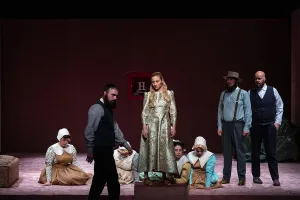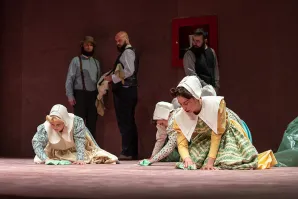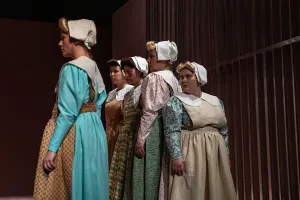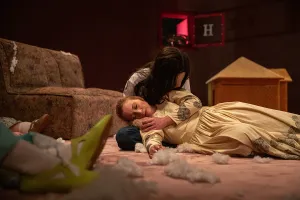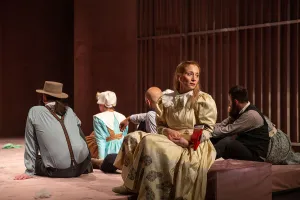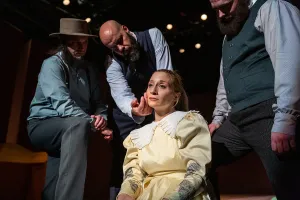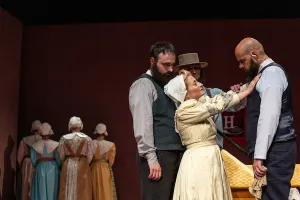A lullaby for Aleksija Rajčić
drama by Đorđe Kosić
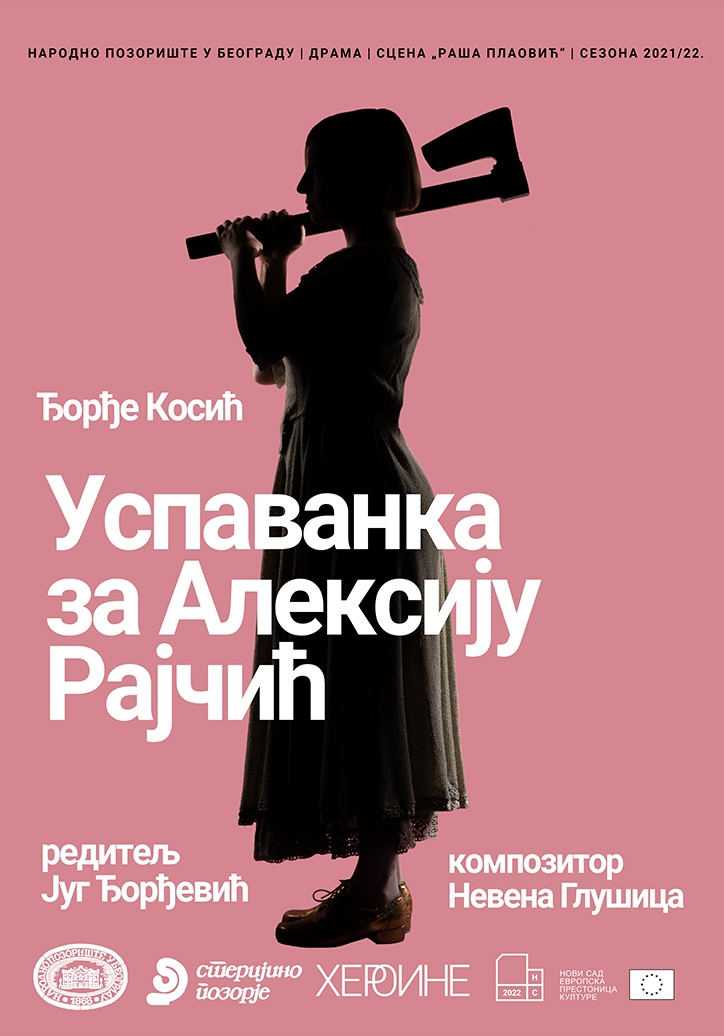
A WORD FROM THE DIRECTOR
Aleksija Rajčić, the main heroine of Đorđe Kosić's play, did not have many choices in life. Like all the other women she is surrounded by, and whose lives represent the model by which hers is expected to function, in a world steeped in patriarchy, the only thing expected from Aleksija is to keep silent and endure hardships. The only alternative to a life that, even before it began, was predestined for violence, the impossibility of choice, and thus the impossibility of emancipation or happiness is – death. Through a specific stylistic intervention in which he combines all the supporting characters in a male and female choir, the author of the play singles out Aleksija and her experience, thus putting them in counterpoint with the depersonalized characters of this story, i.e. society, which is the biggest obstacle in this woman’s search for freedom and happiness. In addition to the formal shaping of the text, the playwright also plays with the language, thus skillfully depicting the traumatic life story of a woman who, paradoxically, finds a way out of the vicious circle of violence and ultimate freedom in prison. Although the style and language of this story may lead us to think that it took place some time ago, in some recent or distant past, we unfortunately witness such women's destinies even today. In 2021, a total of 20 murders of adult women in a family partnership context were recorded in Serbia, as well as 16 attempted murders of women, and it is not possible to establish how many women die as a result of enduring violence for many years. Many of these women reported their abusers, but the system did not protect them. In such a system, which has many forms, but which is the least of all on the side of the victim, women often see no other way out but to "take justice into their own hands."
Tijana Grumić, dramaturge
 ĐORĐE KOSIĆ was born in 1996 in Belgrade. He graduated from the Fourth Belgrade Grammar School, major in social sciences and languages. He was an amateur actor ("God Is a DJ" directed by M. Lolić; "21-12-2012" directed by N. Radović). He completed his undergraduate studies in Dramaturgy at the Faculty of Dramatic Arts in Belgrade, where he received “Josip Kulundžić” Award from the Dramaturgy Department for outstanding achievements in the field of theatre, film, radio or television and “Slobodan Selenić” Award for best graduate drama.
ĐORĐE KOSIĆ was born in 1996 in Belgrade. He graduated from the Fourth Belgrade Grammar School, major in social sciences and languages. He was an amateur actor ("God Is a DJ" directed by M. Lolić; "21-12-2012" directed by N. Radović). He completed his undergraduate studies in Dramaturgy at the Faculty of Dramatic Arts in Belgrade, where he received “Josip Kulundžić” Award from the Dramaturgy Department for outstanding achievements in the field of theatre, film, radio or television and “Slobodan Selenić” Award for best graduate drama.
His play Now Is Not July was shortlisted at the competition for the original Serbian dramatic text at Sterijino Pozorje Festival in 2019, and it was read publicly in Belgrade, Šabac and Zagreb. He won the award at the competition for the original domestic drama text in 2020 at the Sterijino Pozorje Festival for the play A Lullaby for Aleksija Rajčić.
He worked as a dramaturge on the following plays: How Much Is Your Iron (Faculty of Dramatic Art, Atelje 212), Shklovsky: Energy of Delusion (Heartefact Fund), Realistically, Why Not? (“Vuk Karadžić” Cultural Institution), Penthouse: Ordinary Man (Organisation of Musical Authors of Serbia (SOKOJ), Student Cultural Center (SKC), University of Arts in Belgrade), 35 Calories Without Sugar (Studio Center, Belgrade Youth Center), White Kidneys (Atelje 212 - Dramaturgy Assistant), Epic Fiction (Studio Centre, Belgrade Youth Centre), Gulliver ("Duško Radović" Little Theatre), Placebo (National Theatre in Priština), Hansel and Gretel ("Pinocchio" Puppet Theater), Clockwork Orange (Katran Shock Show Industry), A Midsummer Night’s Dream ("Duško Radović" Little Theatre), In the Jaws of Life (Belgrade Drama Theatre - dramaturge associate), Pigs (Boom! Theatre), The Pelican (National Theatre in Belgrade), King Ubu or the Poles (National Theatre in Pirot). Also, he was the dramaturge of the first three editions of the “Angažman Fest” - engaged youth theatre festival.
He is one of the founders and a member of Pointless Films creative group. He wrote the screenplay for the feature film "Butch Cassidy: Euphoria Live" produced by Pointless Films, as well as for the award-winning short film A Beautiful Day (2019, directed by David Jovanović). In addition, he was the screenwriter of the documentary film FPU 70, produced by the Faculty of Dramatic Arts, on the occasion of the seventieth anniversary of the Faculty of Applied Arts in Belgrade. His screenplay for the feature film Sun Can’t Be Seen No More received financial support at the Film Centre of Serbia competition and the film is currently in post-production.
 JUG ĐORĐEVIĆ was born in 1993 in Vranje. He completed his primary and secondary education in his hometown. In the second year of high school, he won the American scholarship and he finished his third year of high school at the School of the Arts in Rochester, New York.
JUG ĐORĐEVIĆ was born in 1993 in Vranje. He completed his primary and secondary education in his hometown. In the second year of high school, he won the American scholarship and he finished his third year of high school at the School of the Arts in Rochester, New York.
He graduated in Theatre and Radio Directing at the Faculty of Dramatic Arts in Belgrade in the class of Professors Nikola Jevtić and Dušan Petrović. During his studies, he directed Sara Radojković's play "Chatroom - Wrong Profile" (2014) at the DADOV Youth Theatre, as well as a part of the omnibus "A Triptych for a Teenager" (2016) by Strahinja Madžarević at the same theatre. He directed the graduation play "The Stuntman" by Strahinja Madžarević at the jubilee Tenth International Student Theatre Festival in Belgrade.
In 2015 at “Bora’s Days” Festival held in Vranje, he directed the stage reading of the play "An Illustrated Encyclopedia of Disappearance" by Božidar Knežević, awarded at the competition for the original Serbian dramatic text within “Sterijino Pozorje” Festival. He worked as an assistant director on productions at the “Boško Buha” Theatre ("A Midsummer Night's Dream", directed by Đ. Tešić), Terazije Theatre ("Mamma Mia" and "The Phantom of the Opera", directed by J. Radivojević ) and at the National Theatre in Belgrade ("Mary Stewart", directed by M. Lolić; "Cyrano", directed by I. Vuković; "Kingdom of Heaven", directed by J. Lorenci).
He made his professional directorial debut at the Bora Stanković Theatre in Vranje by directing the play based on the text by Tijana Grumić "Kepler 452-b." For the same play Tijana and Jug shared the Special Award for New Theatrical Sensibility at the 54th “Joakim Vujić” Festival of Professional Theatres of Serbia in Novi Pazar. The same play was in the main selection of the 63rd Sterijino Pozorje Festival in 2018. In the same year, he directed Ognjen Obradović's play "How to Grow a Ficus" at the National Theatre in Užice, and the play "A Triptych about Workers" (text by Sara Radojković, Strahinja Madžarević and Tijana Grumić) under his direction, opened a new City Theatre in Čačak. In December 2018, he directed the play "Dolce Vita" by Jelena Paligorić at the Opera and Theatre Madlenianum. At the beginning of 2019, he directed John P. Shanley's play "Doubt" at the National Theatre in Kraljevo. In the same year, at the 55th “Joakim Vujić” Festival of Professional Theatres of Serbia in Kraljevo he received a special award for directing the plays "Doubt" and "A Triptych about Workers." At the end of 2019, he directed "Impure Blood" dramatized by Tijana Grumić at the "Bora Stanković" Theatre in Vranje, as well as the play "One Oedipus" by Armando Nascimento Rosa at the National Theatre in Niš.
He won the Best Director Award at the 5th Theatre Spring in Šabac, for directing the play "Impure Blood". At the beginning of 2021, he directed R. V. Fassbinder's play "Water Drops on Burning Rock" at the Belgrade Drama Theatre, as well as "A Streetcar Named Desire” by Tennessee Williams at the National Theatre in Sombor. In the same year, he directed the play "About Gilgamesh" by Tijana Grumić at the City Theatre in Čačak, as well as her play "Stains" at the Kraljevo Theatre.
A NOTE BY THE DIRECTOR
When in 1898 Milutin A. Popović published his book “Female Convicts – An Album of the Požarevac Penitentiary Female Ward” it was a historic moment because room was given to female “criminals” at the literary scene to tell their version of the story. This book served as an inspiration to Đorđe Kosić to write the play “A Lullaby for Aleksija Rajčić”. A century and a half later, we are on the National Theatre stage and we listen to the testimony of one of the convicts. Unfortunately, it does not take us long to realise how far from ideal the position of women in the world is, particularly in our country, but when you realise that in our region the narrative in which a woman is a second-class being has been pervading throughout entire history, then staging a play such as this becomes inevitable. Aleksija is the forerunner of destinies of thousands of women whose lives ended in correctional facilities, only because they were driven to take justice into their own hands because, otherwise, justice was out of reach for them. If this summary sounds familiar it is because since the end of the 19th centry to this day little has changed. Aleksijas even in today’s world are forced to stand up for themselves in the same way because the system of protection almost does not exist. And if it does, it is probably lost in a sea of paperwork, legal procedures of presenting evidence, expert witnessing, confrontation and retraumatisation.
Jug Đorđević, Director
Premiere performance
Directed by JUG ĐORĐEVIĆ
Composer NEVENA GLUŠICA
Dramaturge TIJANA GRUMIĆ
Set Design ANDREA RONDOVIĆ
Costume Design VЕLIMIRKA DAMJANOVIĆ
Coreographer DAMJAN KECOJEVIĆ
Vocal Coach LJILJANA MRKIĆ POPOVIĆ
Associate Ethnomusicologist DANICA KRSTIĆ
Producer JASMINA UROŠEVIĆ
Stage Manager SANDRA ROKVIĆ
Prompter DANICA STEVANOVIĆ
Premiere Cast:
Aleksija Rajčić VANJA EJDUS
Choirmasters IVA MILANOVIĆ, NOVAK RADULOVIĆ
Choir: SARA RISTIĆ, NEVENA MILOŠEVIĆ, VERA ZEČEVIĆ, DANIJELA MILOŠEVIĆ, MLADEN LUKIĆ, GORAN MILOŠEVIĆ
Light Operator SRĐAN MIĆEVIĆ
Make-Up MARKO DUKIĆ
Stage crew Chief ZORAN MIRIĆ
Sound Operater ROKO MIMICA, DEJAN DRAŽIĆ
COSTUMES AND SET WERE MANUFACTURED IN THE NATIONAL THEATRE WORKSHOPS

